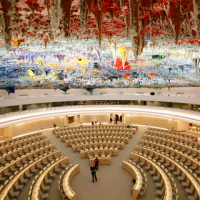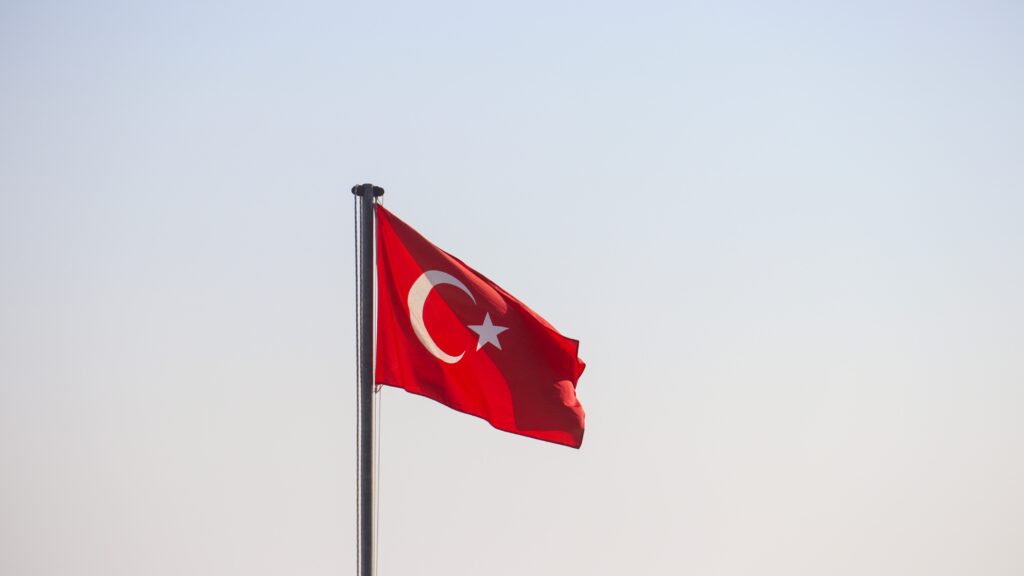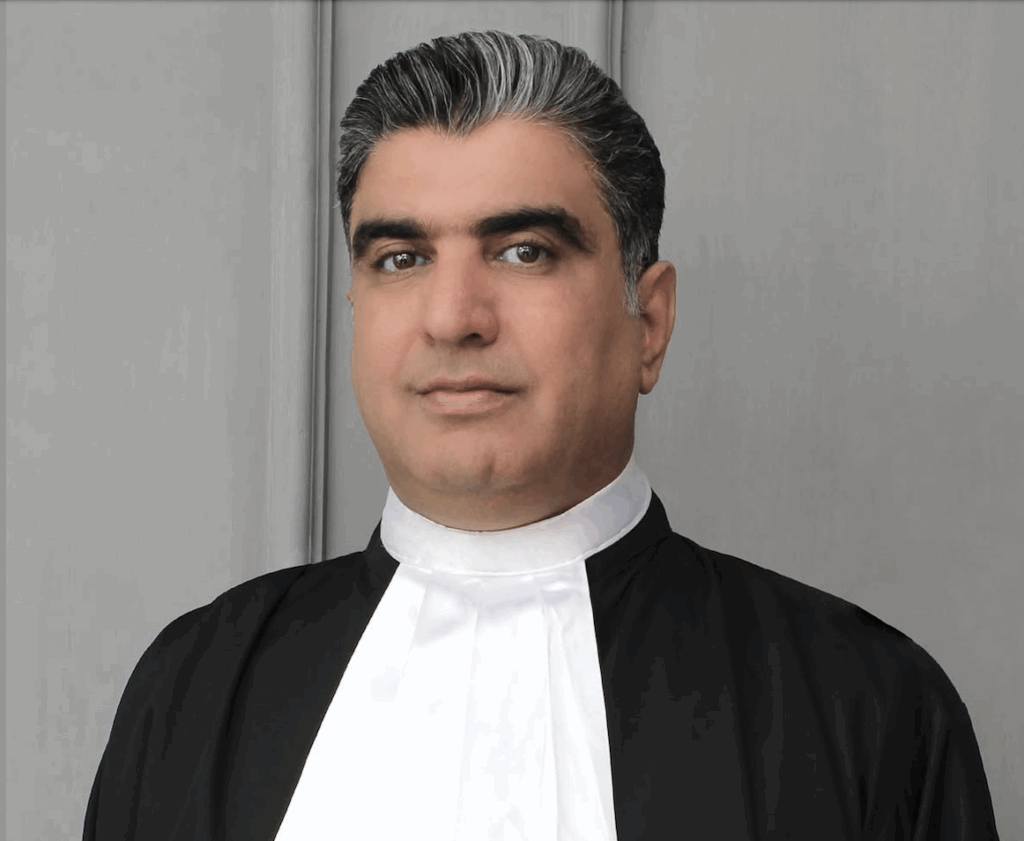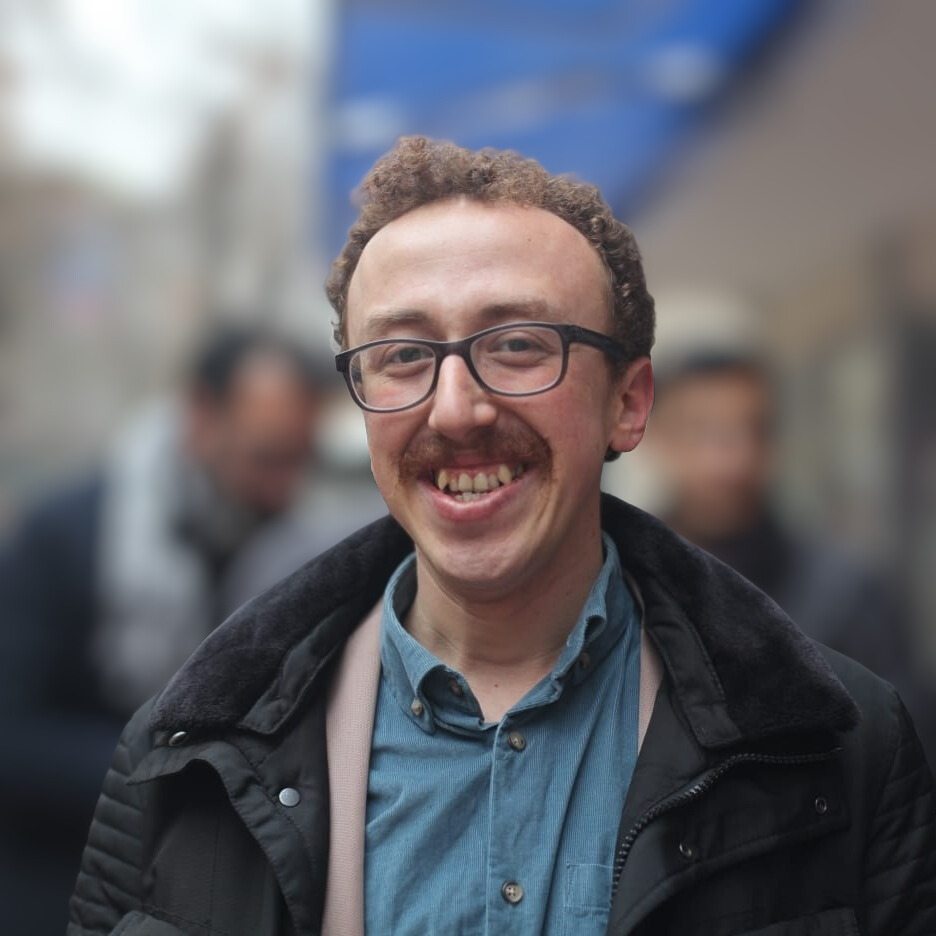Lawyers’ Rights Watch Canada, Lawyers for Lawyers, the International Bar Association, and The Law Society submitted a joint written statement on the systematic and widespread arbitrary detention of lawyers and other human rights defenders in Iran to the United Nations Human Rights Council.
The statement reads as follows:
Introduction: Prolonged arbitrary detention
Lawyers and human rights defenders in Iran face a perpetually “unpredictable and repressive environment”consisting of systematic and widespread arbitrary arrests, unfair trials, prolonged arbitrary detention, and ill-treatment. Numerous lawyers and other human rights defenders (“lawyers and defenders”) are being arbitrarily detained based on illegitimate charges and unfair trials that violate Iran’s national and international obligations. Lawyers and defenders are unlawfully criminalized for undertaking the legitimate professional activities and peaceful human rights work, especially labour rights, women’s rights, ethnic/religious minority rights, and the rights of detained lawyers, defenders, and their family members.
Lawyers and defenders face charges based on vague and overbroad laws that violate the international law principle of legality and Iran’s obligations under the International Convention on Civil and Political Rights (ICCPR). Unfair prosecutions, convictions, and arbitrary detention of lawyers also violate the Basic Principles on the Role of Lawyers (Basic Principles), particularly Principles 16 and 23 on lawyers’ rights to function without harassment or intimidation, and their right to freedom of expression, association, and peaceful assembly. Unsafe prison conditions, torture, and ill-treatment violate ICCPR (Article 7) and the Standard Minimum Rules for the Treatment of Prisoners (Mandela Rules).
UN interventions
During its 49th session, the Human Rights Council (HRC) adopted resolution 49/L.9, “Recognizing the contribution of human rights defenders,” particularly that of women defenders, in “strengthening understanding, tolerance and peace, and contributing to conflict prevention,” denouncing all acts of intimidation against defenders. At the 49th session the Special Rapporteur on the Human Rights Situation in Iran highlighted the role of Iran’s Revolutionary Courts, which, despite lacking a constitutional basis, is the primary route through which political activists, journalists, lawyers, and defenders are targeted in legal proceedings where they are tried and sentenced behind closed doors (including all lawyers and defenders named in this statement). Convictions are influenced by intelligence bodies. Revolutionary Courts consistently violate fundamental human rights including fair trial rights contained in ICCPR Article 14. Also at the 49th session, the Special Rapporteur on Freedom of Religion or Belief expressed particular concern about the arbitrary detention of Iranian women’s rights advocates, including those campaigning against compulsory veiling laws.
In May 2021, eleven Special Procedures mandates urged Iran to end its pattern of unfair prosecution, conviction, and systematic arbitrary detention, expressing “profound concern regarding the widespread detention of human rights defenders and the heavy sentences frequently handed down to them.” In 2019, the UN Working Group on Arbitrary Detention (WGAD) noted that the situation in Iran “indicates a systemic problem with arbitrary detention… which amounts to a serious violation of international law” including “peremptory [jus cogens] and erga omnes norms.” The WGAD highlighted that “under certain circumstances, widespread or systematic imprisonment or other severe deprivation of liberty in violation of the rules of international law may constitute crimes against humanity.”
Violations of the ICCPR
The international law principle of legality (Article 15 ICCPR) requires that all laws be legitimately passed and sufficiently precise to allow people to know in advance what behaviour is unlawful so that they can govern their actions accordingly. Furthermore Iran’s Civil Code, Article 9, provides that ratified treaties including the ICCPR have the same force as parliamentary legislation. The vague and overbroad laws under which arbitrarily detained lawyers and defenders are prosecuted criminalize lawful activities protected by the ICCPR, including freedom of expression (Article 19), peaceful assembly (Article 21), and association (Article 22). In March 2022, the Special Rapporteur on the situation of human rights in Iran reported to the HRC about the illegality of vaguely defined security provisions in the Islamic Penal Code which are routinely used to unlawfully detain lawyers, defenders, and their family members.
Examples
In July 2021 lawyer Mr. Amirsalar Davoudi was sentenced to 29 years imprisonment after unfair trials based on illegitimate charges including “insulting officials,” “insulting the Supreme Leader,” “spreading propaganda against the system,” and “cooperation with a hostile government” for using social media and global Iranian news services to raise concerns about Iran’s treatment of defenders.
Arbitrarily detained since June 2018, lawyer Ms. Nasrin Sotoudeh was sentenced to a combined 38 years’ imprisonment on nine charges, including “encouraging corruption and prostitution,” because of her work defending women arrested for peacefully protesting compulsory veiling laws.
In February 2021, lawyer Ms. Hoda Amid and defender Ms. Najmeh Vahedi were convicted of “cooperating with the hostile US government” after conducting educational workshops for women on marital and familial rights under the law.
Lawyer Ms. Farzaneh Zilabi was sentenced to one year imprisonment for “propaganda activities against the State” and “publishing falsehoods” for representing Sugarcane Workers Union employees who had been denied wages.
Lawyer Mr. Mohammad Najafi has been arbitrarily detained since 2018 on multiple convictions due to his defence of civil and political rights including seeking accountability for the deaths of detained defenders. His longest sentence was 10 years, but with recent reductions in prison sentences ordered by the judiciary, his imprisonment was reduced to 54 months.
In July 2020 lawyer Payam Derafshan, who previously represented other lawyers and defenders, including Nasrin Sotoudeh, was sentenced to 2.5 years imprisonment for charges including “acting against national security.” While in prison he has faced “abuse and medical negligence” by the Islamic Revolutionary Guard Corps, including solitary confinement, forced medical injections, shock therapy, and transfer to a psychiatric hospital.
Prison conditions: COVID-19, solitary confinement
As a State party to the International Covenant on Economic, Social, and Cultural Rights (ICESCR), Iran is “obliged to respect, protect and fulfil the right of everyone to the enjoyment of the highest attainable standard of physical and mental health,” including detainees. The Mandela Rules emphasize States’ duties to ensure the health and safety of prisoners.
During the COVID-19 pandemic, political prisoners and prisoners of conscience were excluded from Iran’s temporary release of detainees. Overcrowding, poor sanitary conditions, and shortage of protective equipment, testing, and treatment have led to the spread of coronavirus among detainees, resulting in a number of deaths. In September 2021 the High Commissioner for Human Rights urged Iran “to pursue many more temporary releases, as an urgent public health measure, and to immediately release political prisoners and prisoners of conscience.”
Iran continues to hold some lawyers and defenders in prolonged solitary confinement. The Mandela Rules define solitary confinement as lack of “meaningful human contact for 22 hours or more” per day lasting more than 15 consecutive days (Rule 44), stressing that solitary confinement is to be used only as an extraordinary measure “in exceptional cases” for as short a time as possible. Misuse of solitary confinement violates ICCPR Article 7 which prohibits “torture, or other cruel, inhuman or degrading treatment or punishment.”
Examples
After his arrest in November 2018, Amirsalar Davoudi was held in solitary confinement in Tehran’s Evin prison for 190 consecutive days. He was excluded from the March 2020 COVID-19 prisoner release and contracted COVID-19 in August 2020.
Nasrin Sotoudeh was excluded from the COVID-19 prisoner release and went on a prolonged hunger strike aiming to persuade authorities to release political prisoners. She was then transferred to reportedly dangerous Qarchak prison where she contracted COVID-19, exacerbating pre-existing health conditions.
Mohammad Najafi has been denied medical treatment despite having a heart attack in 2019.
Free speech campaigner Baktash Abtin died in May 2022 after contracting COVID-19 at Evin prison.
Recommendations
We request that the Council insist that Iran:
- Immediately and unconditionally release all lawyers and defenders arbitrarily detained for lawfully performing their professional activities.
- Ensure fair trial rights guaranteed by the ICCPR.
- Revise Iran’s Penal Code to comply with the principle of legality,the ICCPR and ICESCR;
- Ensure compliance with the Mandela Rules;
- Ensure that all legal professionals and defenders may carry out their lawful professional duties without any improper interference, “intimidation, harassment, arbitrary arrest, deprivation of liberty, or other arbitrary sanctions”; and
- Cooperate with the HRC, including assuring full and unfettered access to Iran by all Special Procedures requesting country visits.




